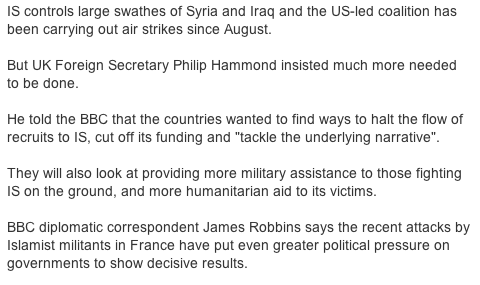This has always seemed a bit odd of the BBC, don’t you think?
A while ago, we caught the Daily Mail using claim quotes for an assertion that only the writer of the story had made. This is almost the opposite: the quoting of a fellow journalist at the same news organisation as though he were a third party voicing an unproven opinion.
It’s a widespread phenomenon on the BBC website:
A large part of the problem is that, unlike TV news reports with their time-honoured verbal signoffs (“Joshua Rozenberg, at the high court, for BBC News”), most BBC web stories carry no byline. That means there is no implied authorial expertise in the piece itself, so the writers have little choice but to rely on the broadcast arm’s brand-name correspondents. But quoting a journalist that readers recognise does draw attention to the fact that the author of the article is not that journalist, and leaves a puzzle as to whose voice the article is actually speaking in.
In a print environment, the contribution would simply be folded, unattributed, into the body copy and the legal correspondent’s name would be added to the byline. In an anonymous article, that’s not possible. But done like this, the reporter seems reduced to third-party status: just another interviewee like the foreign secretary or the copyright lawyer; just another participant in the debate with a point of view.
The BBC, as a high-profile public body with an intrinsically political source of funding, has a long tradition of having to report on itself. Normally, it does this with fearsome impartiality, even in the most existential of crises, such as the row over the Hutton report. When an official inquiry condemned its reporting on the intelligence dossier that played a central role in the Iraq war, the chairman and director-general both departed within a week. But BBC News, responding to the story, reported on BBC News, the instigator of the incendiary report, as though they had never met.
Carol Malia, who presents the Look North evening news programme, was involved in a protest at the BBC’s studios in Newcastle.
She said: “Any news organisation has to be seen as impartial to be credible and that is what we are fighting for.”
Mike Baker, an education correspondent in London who has worked for the BBC for 24 years, said staff wanted to make a “symbolic” protest.
Any newspaper would have closed ranks and decried injustice in banner headlines. The BBC interviewed colleagues on its own solidarity demonstration as though they were striking factory workers in Pennsylvania.
The problem is, impartiality as acute as that creates echoes even when you don’t want it to. Look at the quote in the story from Clive Coleman, the legal correspondent, in the article about Rihanna. It’s hard to know quite how to take it. It’s a simple statement of fact, but has been attributed to someone other than the author. Does that suggest that it is, in fact, open to doubt? Has it not been checked – or could it not be double-sourced in accordance with the BBC’s rules? (Although if it turns out to be wrong, the corporation could not possibly be hoping to distance itself from someone identified as a BBC correspondent.) Is it true or not?
Or is the identification of Mr Coleman as an employee of the organisation meant as an assurance of quality? In which case, it would be much better to have no attribution at all, and write it into the story as fact, along with his supporting evidence for the statement.
Fairness and balance is the highest of journalistic goals – indeed, for BBC News, funded by every licence-payer in Britain, it’s the only way it can possibly operate. But, as Jay Rosen has pointed out, there is such a thing as too much innocence in journalism. Putting quotes around facts determined by your own specialist correspondents just gives impartiality a bad name.





